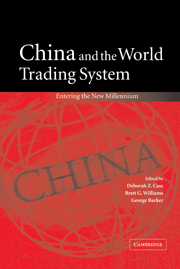Book contents
- Frontmatter
- Contents
- List of figures
- List of tables
- List of contributors
- Preface
- Acknowledgements
- Abbreviations and acronyms
- Introduction: China and the reshaping of the World Trade Organization
- PART I The world trading system
- PART II The accession
- PART III China – the domestic sphere
- PART IV Trade in goods
- PART V Trade in services and competition policy
- PART VI Intellectual property
- 18 Chinese trademark law and the TRIPs Agreement – Confucius meets the WTO
- 19 TRIPs goes east: China's interests and international trade in intellectual property
- 20 The impact of China's WTO membership on the review of the TRIPs Agreement
- PART VII Dispute settlement
- Select bibliography
- Index
19 - TRIPs goes east: China's interests and international trade in intellectual property
Published online by Cambridge University Press: 28 July 2009
- Frontmatter
- Contents
- List of figures
- List of tables
- List of contributors
- Preface
- Acknowledgements
- Abbreviations and acronyms
- Introduction: China and the reshaping of the World Trade Organization
- PART I The world trading system
- PART II The accession
- PART III China – the domestic sphere
- PART IV Trade in goods
- PART V Trade in services and competition policy
- PART VI Intellectual property
- 18 Chinese trademark law and the TRIPs Agreement – Confucius meets the WTO
- 19 TRIPs goes east: China's interests and international trade in intellectual property
- 20 The impact of China's WTO membership on the review of the TRIPs Agreement
- PART VII Dispute settlement
- Select bibliography
- Index
Summary
Introduction
China's implementation of the WTO Agreement on Trade-related Aspects of Intellectual Property Rights (TRIPs) is generally characterized as reluctant compliance with externally imposed standards. China seemingly goes against the cultural grain and impairs its own economic interests to introduce ‘strong’ protection of intellectual property rights (IPRs), only to safeguard its real trade interests (access to developed-country markets, principally the United States, and WTO membership).
This chapter first sets ‘TRIPs implementation’ in the broader context of China's underlying economic interests, by considering the emerging status of China as a producer, beneficiary and exporter of intellectual property. It then considers how ‘TRIPs implementation’ has been undertaken within the framework of a longstanding programme of domestic legal development, that has been shaped just as much by domestic social and economic imperatives as by reactive compliance with external demands.
Background: IP as a trade issue
The extensive literature on protection of IPRs in China is outweighed by writing on the lack of IPR protection. The issue takes a high profile in China's trade relations. IPR infringement is unquestionably widespread in China. A senior patent office official acknowledges that patent infringement is ‘rather rampant’. The International Intellectual Property Alliance (IIPA), a US-based industry body, claims that:
Despite efforts made by the Chinese government to crack down on massive domestic piracy of all types of copyrighted products earlier in 2000, including raids netting hundreds of thousands of pirate optical media products, piracy rates in China continue to hover at the 90% level.
- Type
- Chapter
- Information
- China and the World Trading SystemEntering the New Millennium, pp. 345 - 362Publisher: Cambridge University PressPrint publication year: 2003
- 1
- Cited by

